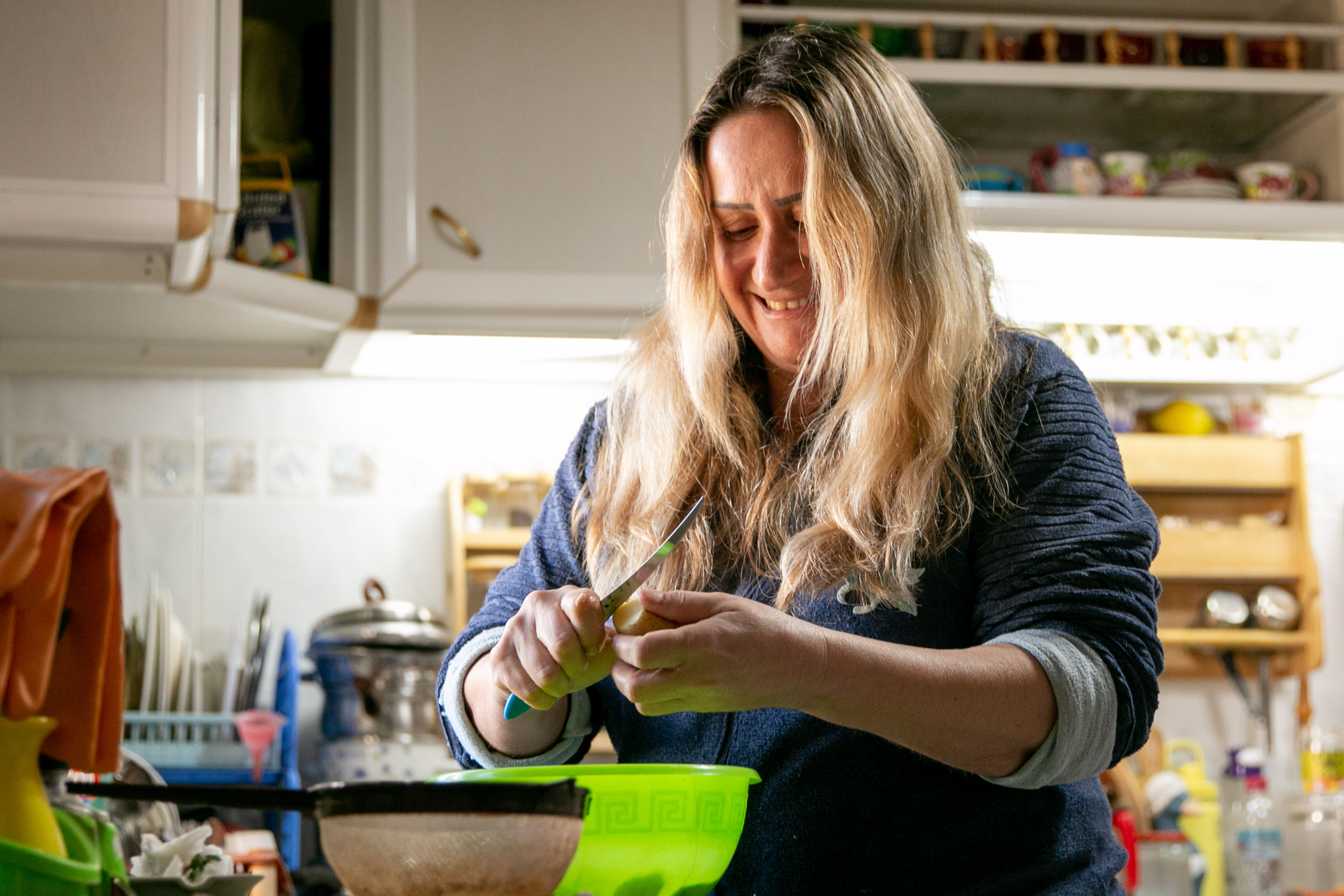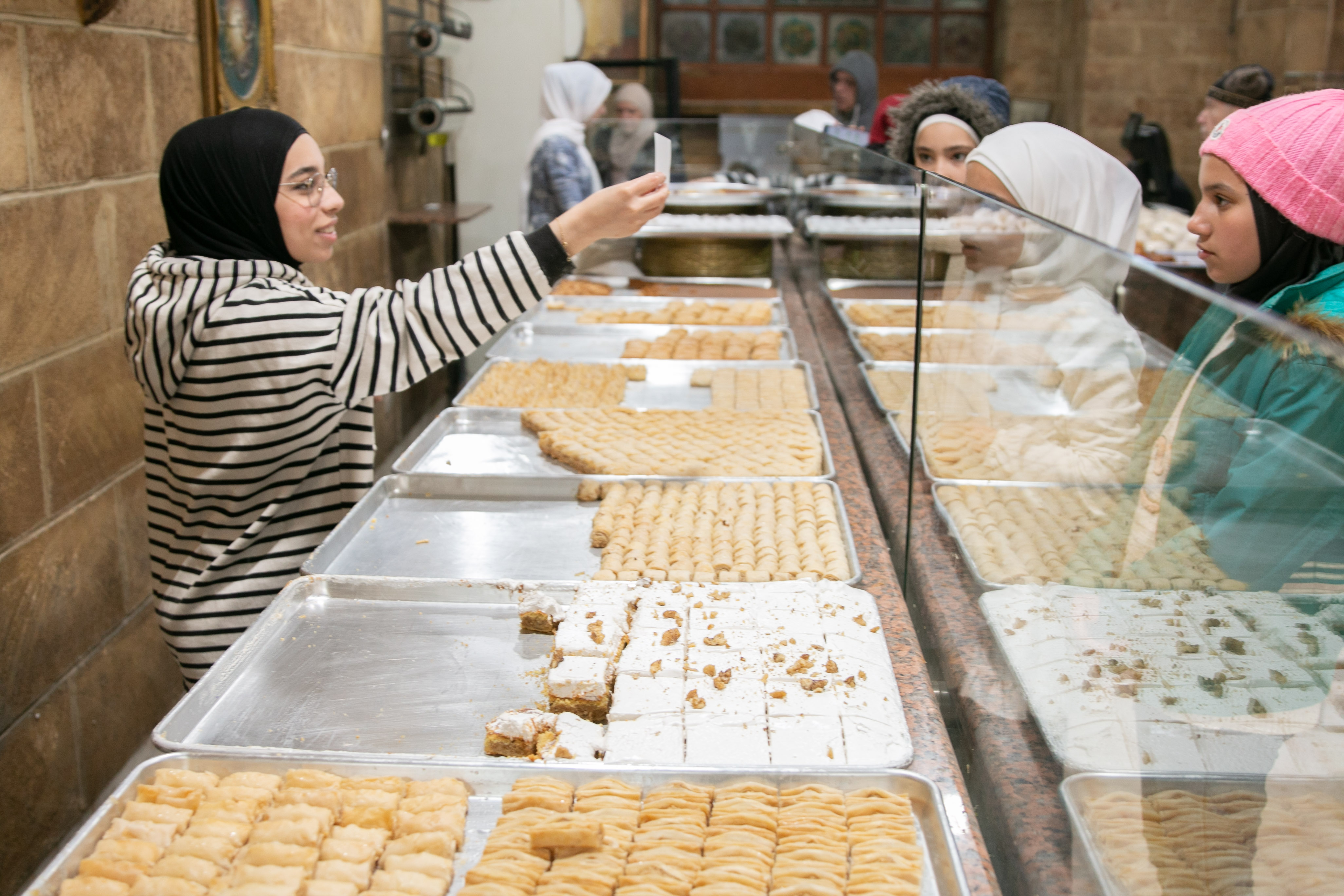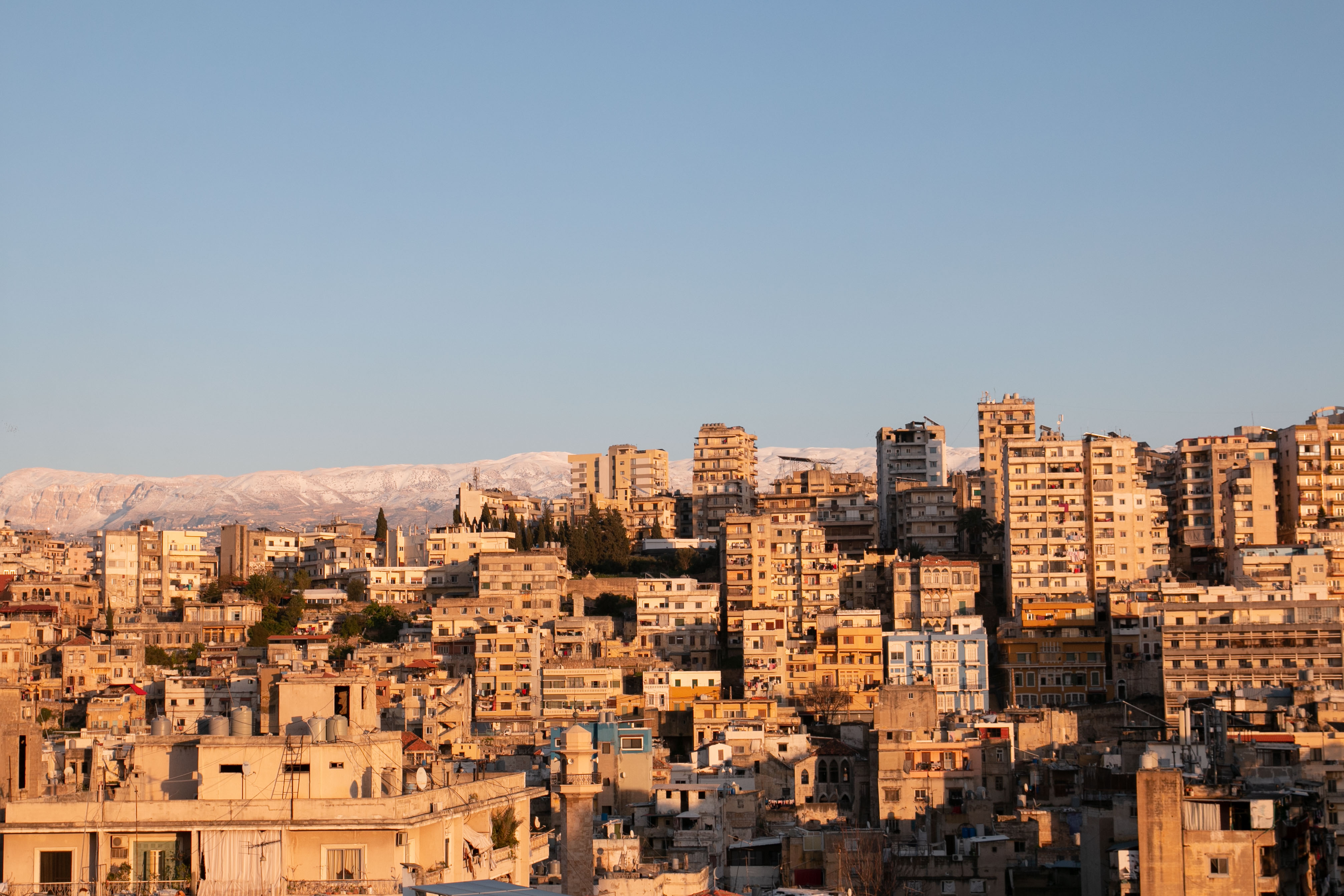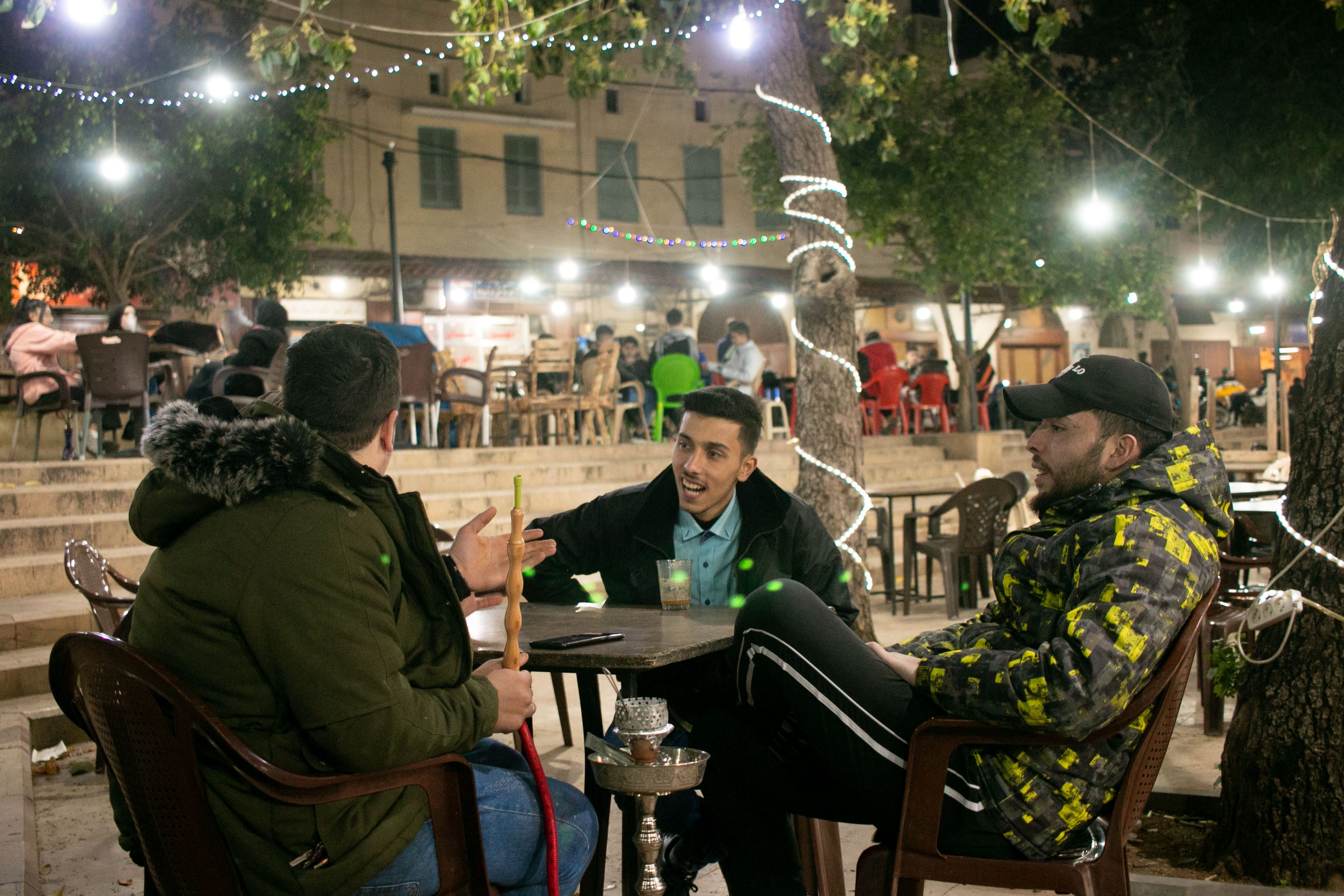
Hussein, the son of Fadia al-Jamil, prepares to break the Ramadan fast in the old souks of Tripoli on March 30, 2023. (Credit: Philippe Pernot)
It is noon in the middle of Ramadan.
The silence of the nearby olive groves and the Mediterranean Sea reigns in Koura, North Lebanon. Gentle rays of sunlight stream into Rania Jalal Soufi’s apartment, breaking through the prevailing darkness due to power outages.
The freelance real estate agent has been fasting since sunrise and is already preparing the iftar meal for sunset.
“I’m not very religious, I don’t wear a headscarf, and I don’t pray every day, but as a Muslim, fasting is important to me,” said the 40-year-old mother.
Enticing aromas emanate from the kitchen: today’s menu includes not only the traditional shorba 3adass (lentil soup) and Arabic sweets, but also, for a change, home-made hamburgers and fries.
“I prepare small quantities because I’m only breaking the fast with my son and daughter, and we can’t afford larger portions anyways,” Rania explained. “I also don’t go to Tripoli to visit my family as often anymore because gas has become too expensive.”
 Rania al-Soufi prepares the iftar meal in her apartment in Koura (North Lebanon) on March 31, 2023. (Credit: Philippe Pernot)
Rania al-Soufi prepares the iftar meal in her apartment in Koura (North Lebanon) on March 31, 2023. (Credit: Philippe Pernot)
Her husband works in Bahrain and sends money to the family, but because of Lebanon’s hyperinflation, the family has still lost purchasing power. She is one of many Lebanese who could be forced below the poverty line as inflation continues to skyrocket.
Since the start of the crisis in 2019, the Lebanese lira has lost 98 percent of its value. Staple food prices have risen 260 percent this February alone. According to the UN, four out of five people in Lebanon live in multidimensional poverty, with most having to skip at least one meal a day.
In Tripoli, not far from Rania’s home, the situation is worse than the national average. Its 300,000 inhabitants call the city “Umm al faqira” (“Mother of the Poor”) — as the city was marginalized long before the current economic crisis.
A drive into the town center shows its scars. The richly decorated facades of Zehrieh, a once prosperous neighborhood from the time of the French colonial epoch (1916 to 1943), are blackened by pollution; electric cables hang in the air; and most houses look like they could collapse any second.
But Zehrieh is also home to some of the city's most famous sweets stores, which are overrun with people from all walks of life hours before iftar.
 Customers buy karbouj at the Malak al-Halawiat pastry shop in Tripoli on March 30, 2023. (Credit: Philippe Pernot)
Customers buy karbouj at the Malak al-Halawiat pastry shop in Tripoli on March 30, 2023. (Credit: Philippe Pernot)
“Tripoli is famous throughout Lebanon for the quality and variety of its Arabic pastries,” Jihad Harmoush says with pride. “And especially during Ramadan, they are indispensable.”
The 50-year-old runs “Malak al Halawyiet” (“King of Sweets”), a store with old brick arches and paintings.
Karbouj — pistachio or nut dough with homemade whipped cream — is prepared especially for Ramadan.
“But the ingredients have all become much more expensive,” the shopkeeper says with a sigh. “We have to pay for them directly in dollars. Now a kilo of karbouj costs more than a million lira (about $10)!”
“Before the crisis, our customers could order by the kilo, but now they only buy small quantities,” Harmoush adds.
This is especially tragic because many stores generate half a year’s income during Ramadan. Jihad’s own monthly salary has shrunk from $2,000 to $200, he says.
Non-governmental organizations play a big role in this context.
“Three years ago, we supported 5,000 families, but now it is more than 20,000,” reports Hala Karame, an employee of Sanabel an-Nour, an Islamic NGO that organizes food distributions, among other things.
During Ramadan, giving zakat (donations to those in need) is mandatory for Muslims, so the month is especially important for NGOs.
“We were founded 30 years ago during Ramadan, even today we have to help a lot during the holy month. People can barely afford gas canisters for cooking and basic food,” she explains. “Now we even have to help the former middle class. Since 2022, we also provide food and money to teachers and state employees.”
Iftar in the old city
It will be iftar in a few minutes. The setting sun bathes Tripoli’s old town in a red light while hymns emanate from its ancient mosques. From the crusader fortress on the hill, the view extends over minarets and church towers to the harbor.
Just below, the souks bubble with feverish activity: the arcades, baths, mosques and winding alleys were built during the time of the Mamluks (1250 to 1514) and still house greengrocers, butchers and jewelry and soap makers. Stragglers hurry to buy the last ingredients for the fast-breaking meal.
Then, the chant of prayer resounds: it’s time for Iftar.
 View on the old city of Tripoli and the snow-covered Mount Lebanon on March 31, 2023. (Credit: Philippe Pernot)
View on the old city of Tripoli and the snow-covered Mount Lebanon on March 31, 2023. (Credit: Philippe Pernot)
Many people who live here are considered working-class — their monthly wages mostly do not exceed $50, and most work undocumented and as day laborers.
Fadia al-Jamil, a Syrian woman from a village near Aleppo, hurries with the other women of her household to serve the dishes on time. In her home, the entire family, including guests, sits on the floor around a tablecloth covered with colorful dishes in the traditional Bedouin manner.
As soon as the singing of the muezzins ends, they drink a glass of water, taste a date and gulp down the traditional lentil soup. Afterwards, the meal includes tabbouleh salad, sambusik (pasta stuffed with cheese or seasoned minced meat), fatteh (a dish of yogurt, chickpeas and fried pita bread), foul (fava beans in tahini sauce), vegetarian bulgur kibbeh and fries: the family tries to preserve its traditions despite the crisis.
 A woman buys qatayefs in the old souks of Tripoli on March 29, 2023. (Credit: Philippe Pernot)
A woman buys qatayefs in the old souks of Tripoli on March 29, 2023. (Credit: Philippe Pernot)
Army and police against the protests
After breaking the fast and joining for the evening prayers, many Tripolitans come to Ahwet Mousa, a historical café in Tripoli’s old city. On this large square decorated with lanterns and trees, the city’s inhabitants smoke shisha, drink sweet tea or coffee with cardamom, play cards and laugh, but they also talk about politics.
“The ruling elites are waging an economic war against us. Their weapon is hunger and inflation,” Abdelrahman, a 20-year-old vegetable seller, says while sitting with his friends.
 Abdelrahman (back left), Jamal (profile right) and their friends spend the evening at Ahwet Moussa, in the center of Tripoli on March 30, 2023. (Credit: Philippe Pernot)
Abdelrahman (back left), Jamal (profile right) and their friends spend the evening at Ahwet Moussa, in the center of Tripoli on March 30, 2023. (Credit: Philippe Pernot)
During the 2019 popular uprising, referred to locally as the thawra (“revolution”) and the subsequent protests, the “Mother of the Poor" also became known as the “Bride of the Revolution” because of the energy displayed by its demonstrators.
“All of us here were part of the protests against the political system. On the government’s orders, we were shot at by the army and the police with rubber bullets and even assault rifles,” Abdelrahman recalls, showing a scar on his leg.
His friend Jamal, known among his friends as the “Tripolitan Che Guevara,” even died clinically when an M16 bullet went through his heart. “I woke up after an open-heart surgery and five days in a coma,” he says.
Last year, Jamal tried to escape to Europe on a boat that was allegedly rammed and sunk by the army. “We looked death in the eye,” he said matter of factly.
The group of friends agreed: this year, the Ramadan spirit is tepid because of the crisis.
“Still, Ramadan is a time of happiness, of togetherness. In Tripoli, we stick together,” Abdelrahman says between puffs of his shisha.
Additional reporting by Rayanne Tawil